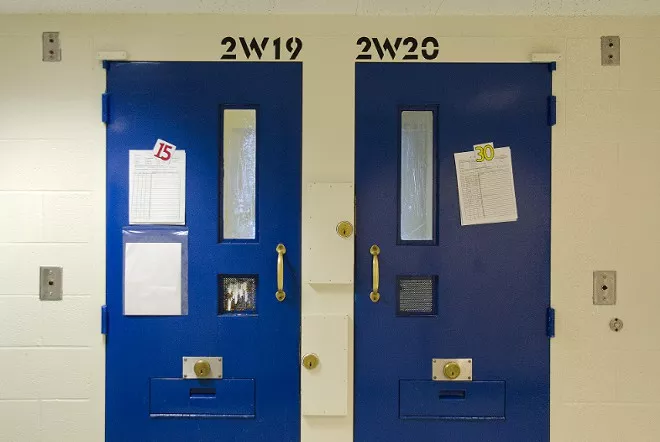Friday, October 3, 2014
Spokane jail's mental health manager describes treatment challenges
People with severe mental health issues have increasingly ended up in the Spokane County Jail where they may spend months awaiting competency evaluations and often decompensating under solitary confinement and limited treatment, reports the jail’s mental health manager in a court declaration filed today.
Kristina Ray, who has overseen the jail’s mental health treatment since 2008, writes she has seen more inmates, often on minor charges, flooding the county jail. Many also show signs of more severe mental health issues as lockdown security protocols only intensify their symptoms.
Spokane County Jail is the only county jail in the state to be licensed as a mental health provider. Despite that certification, Ray says the facility can only do so much as a jail. Most inmates with serious mental health issues spend 23 hours a day in a cell on the mental health floor, which at a capacity of 46 cells is always full. All female inmates stay in separate solitary cells two floors down.
“We have no other place for them,” Ray writes in her declaration. “Unfortunately, solitary confinement is not therapeutic and exacerbates their symptoms. So, the proactive treatments we can provide are not as effective because inmates with mental health illness are both being held in isolation and in a correctional setting.”
Ray explains the number of jail inmates waiting for mental health evaluations has also increased significantly in the past four years. Before they ever see a trial, they spend weeks or months in solitary confinement for an evaluation to determine what kind of treatment they may need.
“I have seen dozens of inmates decompensate after the jail restricts both their freedom of movement and social interaction,” she writes. “Their mental health is further undermined by being housed near other inmates with mental illness who are often kicking and screaming in their cells.”
Ray raises one example of a female inmate who was booked into the jail in April on two misdemeanor assault charges. She has spent six months waiting in one of the jail’s suicide watch safety cells for an evaluation.
“A safety cell, the type of cells used on suicide watch, only has a toilet and sink,” Ray writes. “Inmates will then be evaluated to determine if they can have undergarments, socks, bedroll, pencils, or personal belongings in a safety cell. This particular inmate was denied those possessions. She was often placed in a suicide smock and provided with a safety blanket and mattress to sleep on.”
Ray previously discussed some of these challenges in an Inlander story from earlier this year, but she offered this new frank assessment of the jail’s limitations as part of a recent class action lawsuit against the state Department of Social and Health Services. DSHS operates the state’s two psychiatric hospitals, including Eastern State Hospital in Medical Lake, that conducts inmate mental health evaluations.
Attorneys with Disability Rights Washington and the ACLU of Washington today filed a request for a court order to cut down the time inmates must wait in jail for those evaluations.
In her declaration, Ray voiced support for Eastern State sending evaluators to the jails to help speed up the examination process. But she warned the jail could not serve as an appropriate setting for therapy or other restorative services.
“Ultimately, more community resources may help keep this population out of jail and hooked into resources that don’t involve the criminal justice system,” she writes. “It may also help if ESH dedicated more resources to inmates with mental illnesses waiting in jail for ESH’s competency evaluation and restoration services.”
Kristina Ray Oct. 3 Declaration by inlanderweb
Tags: Spokane County Jail , Kristina Ray , mental health , state of mind , News , Image


















